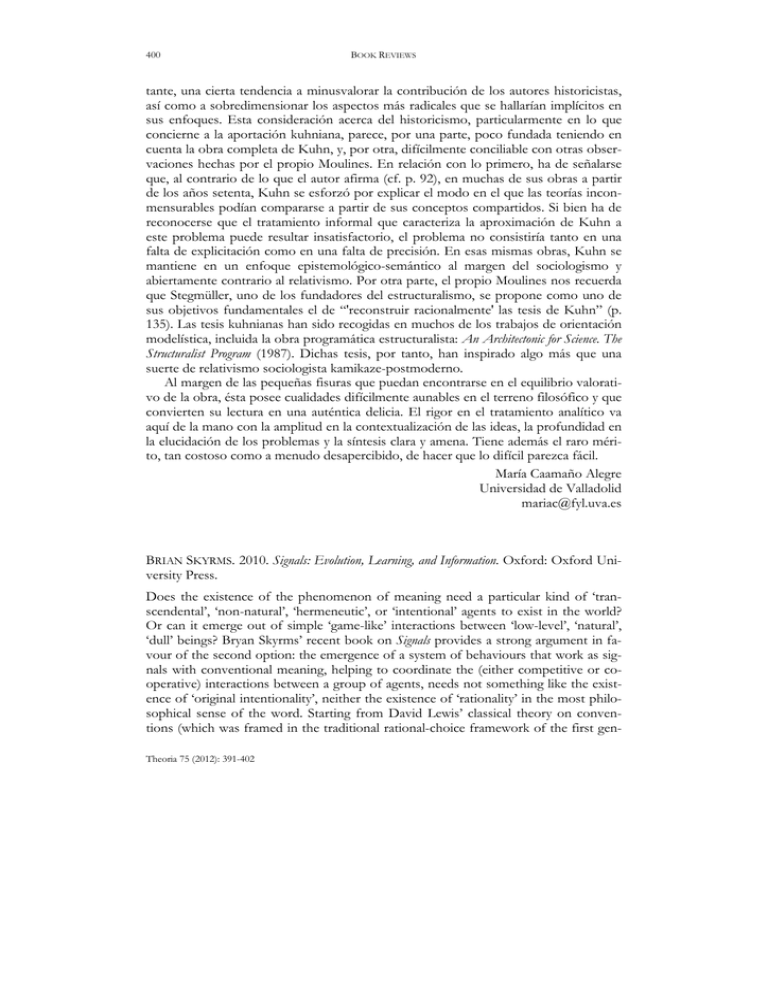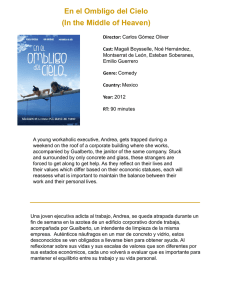tante, una cierta tendencia a minusvalorar la - Philsci
Anuncio

400 BOOK REVIEWS tante, una cierta tendencia a minusvalorar la contribución de los autores historicistas, así como a sobredimensionar los aspectos más radicales que se hallarían implícitos en sus enfoques. Esta consideración acerca del historicismo, particularmente en lo que concierne a la aportación kuhniana, parece, por una parte, poco fundada teniendo en cuenta la obra completa de Kuhn, y, por otra, difícilmente conciliable con otras observaciones hechas por el propio Moulines. En relación con lo primero, ha de señalarse que, al contrario de lo que el autor afirma (cf. p. 92), en muchas de sus obras a partir de los años setenta, Kuhn se esforzó por explicar el modo en el que las teorías inconmensurables podían compararse a partir de sus conceptos compartidos. Si bien ha de reconocerse que el tratamiento informal que caracteriza la aproximación de Kuhn a este problema puede resultar insatisfactorio, el problema no consistiría tanto en una falta de explicitación como en una falta de precisión. En esas mismas obras, Kuhn se mantiene en un enfoque epistemológico-semántico al margen del sociologismo y abiertamente contrario al relativismo. Por otra parte, el propio Moulines nos recuerda que Stegmüller, uno de los fundadores del estructuralismo, se propone como uno de sus objetivos fundamentales el de “'reconstruir racionalmente' las tesis de Kuhn” (p. 135). Las tesis kuhnianas han sido recogidas en muchos de los trabajos de orientación modelística, incluida la obra programática estructuralista: An Architectonic for Science. The Structuralist Program (1987). Dichas tesis, por tanto, han inspirado algo más que una suerte de relativismo sociologista kamikaze-postmoderno. Al margen de las pequeñas fisuras que puedan encontrarse en el equilibrio valorativo de la obra, ésta posee cualidades difícilmente aunables en el terreno filosófico y que convierten su lectura en una auténtica delicia. El rigor en el tratamiento analítico va aquí de la mano con la amplitud en la contextualización de las ideas, la profundidad en la elucidación de los problemas y la síntesis clara y amena. Tiene además el raro mérito, tan costoso como a menudo desapercibido, de hacer que lo difícil parezca fácil. María Caamaño Alegre Universidad de Valladolid [email protected] BRIAN SKYRMS. 2010. Signals: Evolution, Learning, and Information. Oxford: Oxford University Press. Does the existence of the phenomenon of meaning need a particular kind of ‘transcendental’, ‘non-natural’, ‘hermeneutic’, or ‘intentional’ agents to exist in the world? Or can it emerge out of simple ‘game-like’ interactions between ‘low-level’, ‘natural’, ‘dull’ beings? Bryan Skyrms’ recent book on Signals provides a strong argument in favour of the second option: the emergence of a system of behaviours that work as signals with conventional meaning, helping to coordinate the (either competitive or cooperative) interactions between a group of agents, needs not something like the existence of ‘original intentionality’, neither the existence of ‘rationality’ in the most philosophical sense of the word. Starting from David Lewis’ classical theory on conventions (which was framed in the traditional rational-choice framework of the first genTheoria 75 (2012): 391-402 BOOK REVIEWS 401 erations of game theorists), Skyrms develops a new approach based on the theory of evolutionary games, learning theory, the study of networks, and computer simulations, in order to proof that relatively sophisticated systems of signals can emerge out of the interaction of agents in which a minimal capacity of computation is assumed. The structure of this short book is divided in fourteen brief (not self-contained, but relatively self-cogent) chapters that progressively introduce the reader into more and more complex models, from the most simple and classic signalling games of Lewis, to evolutionary models, learning models, the possibility of deception and invention, networks and, lastly, the possibility of signals’ compositionality. Though not a book for the general reader, its logical, technical or mathematical demands are relatively low, and so it can be read by many philosophers or scientists interested in the topic, though it is sometimes too clumsy about what are the reasons why certain problems the author discusses are philosophically or technically relevant. In this sense, a greater effort to make the connection with some discussions on philosophy, epistemology, game theory, etc., would have been welcome. Probably the collection in which OUP has included the book, composed of relatively short volumes, has forced the author to make a choice between introducing as many ideas as possible, or being more philosophically explicit. From a philosophical point of view, perhaps there are other two questions the book deals with which are particularly interesting, and can generate a more prolific discussion within the academia in the future. First, it is Skyrms vision of epistemology as the study of the flow of information. Though the book does not really make clear in what sense this idea is central to the philosophical project the book belongs to, or what is the real contribution the book makes to the development of that idea, I think that book’s claim that game-theoretic interactions create information (p. 39) is extraordinarily important, and can have relevant consequences for a lot of either classical or newer philosophical problems. I think that greater effort must be put into the aspects of Skyrms’ theory that would serve to apply it to particular problems in epistemology (like the reliability of beliefs or of the procedures for acquiring them, the nature of the factors that produce the distinction between true and false information, etc.), but this is surely something we will see in the future. The second interesting point is Skyrms’ virtuosistic confutation of Kant’s claim that lying is immoral because it could not be a ‘universalizable’ maxim. Skyrms shows (p. 80 ff.) that in some cases, some games produce a result in which the information that is provided is systematically deceptive (at least in some senses or partially), but that in those games, the agents are collectively better off by following the strategy in which they send this false information, than by abiding to an ‘always-say-the-truth’ strategy. Perhaps the example is not very realistic, nor ‘deception’ is exactly understood as ‘lying’ in it, but it serves at least as a logical counterexample to the Kantian argument, which should hence be defended on premises different from its apparent universal formal validity. Theoria 75 (2012): 391-402 402 BOOK REVIEWS Lastly, one sceptical point about the book. One is left with the impression that, if signalling were as easy and spontaneous as the different models considered in the book suggest, we lack, hence, an explanation of why something as complex as our human languages has required the existence of a species as intelligent and cognitively sophisticated as ours. Perhaps other animals (or bacteria, or chips) would be able of developing by networked evolutionary gambling something comparable to the vocabulary and grammar of an English textbook for six year old children... but they happened to lack other cognitive and emotional abilities that make that system a toy which is fun to play with. Jesús Zamora Bonilla UNED [email protected] Theoria 75 (2012): 391-402


